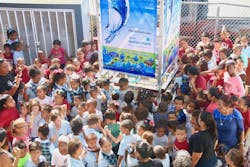About the author: Mark Cain is chief marketing officer for Planet Water Foundation. Cain can be reached at [email protected].
When Hurricane Maria struck Puerto Rico in September 2017, the 155-mph winds took down the electric grid and public water system, leaving the Caribbean island dark, flooded and stranded. Not long after, Planet Water Foundation and its partners responded to the emergency need for drinking water by deploying community-based AquaTower systems—a water filtration solution that produces clean, safe drinking water from nearly any available source, including rivers, canals and contaminated wells. While not originally designed specifically for emergency humanitarian relief efforts, the systems are proving to be the solution this devastated U.S. territorial island needs while it rebuilds.
In addition to providing clean drinking water, the filtration units help support a hygiene initiative that teaches children about the importance of hand washing and germ protection.
Rapid Response
Planet Water Foundation, a U.S.-based nonprofit focused on addressing global water poverty, focuses on bringing clean water access to impoverished communities in the Asia-Pacific and Latin American regions. To respond to the critical need for clean drinking water in Puerto Rico, the organization had to activate key funding and technology partners, logistics to ship components to the island, and local community resources to identify the locations where units were needed and most suited to operate. A rapid deployment plan resulted in an initial set of 12 AquaTowers that began producing drinking water in November 2017, less than two months after the hurricane.
“Understanding the unfortunate circumstances the people of Puerto Rico are facing, we wanted to do our part to respond to the drinking water situation,” said Nick Hill, executive chairman of Planet Water Foundation.
Hurricane Maria devastated the existing water infrastucture in Puerto Rico to such an extent that only a point-of-use (POU) solution could provide the most remote and damaged areas with a safe water supply before an acute humanitarian crisis could arise. Without a safe drinking water supply, families resorted to drinking from polluted wells or streams contaminated with sewage and dead animals. Projects were deployed, focusing on schools and community centers. Since then, 32 additional POU filtration systems have been installed, and the foundation expects to have a total of 41 systems in Puerto Rico until continuity of municipal drinking water is fully restored.
Volunteers from project partners help install the POU filtration systems to provide clean water where it is needed most.
Working Together
Xylem Inc. funded and deployed 10 of the first 12 filtration systems with volunteers, and completed another 12 project deployments. Watts Water Technologies funded two of the first response filtration systems and has completed two additional towers with volunteers.
“The communities were incredible to experience,” said Mainor Vega, treatment manager for Xylem. “Often there were big parties with a priest blessing the tower and children chanting for ‘agua.’ We could really feel what the clean water meant to them.”
Within hours after the first systems arrived, they were placed on heavy trucks and sent across washed out roads and damaged bridges to their destinations. Shortly thereafter, they were assembled and began producing drinking water. Fundación Banco Popular is providing local support with San Juan-based Rayo de Luna, an initiative of Harimau Conservation, leading coordination of local logistics and site identification.
Ongoing Relief
Water is sourced from nearby rivers in some instances, while contaminated wells and untreated reserve tanks also are tapped for supply to the systems. The system uses ultrafiltration technology that removes contaminants and turbidity as water pressure, created by gravity from the elevated holding tank, forces untreated water through the filter. Clean water then is distributed to nine water faucets surrounding the tower; soap dispensers are located next to the faucets.
The systems are suitable for use in most underdeveloped areas, or for emergency response situations because they remove bacteria, protozoa, viruses, pathogens and other contaminants without the use of harmful chemicals. Additionally, each system produces up to 10,000 liters of clean water per day and supports the daily drinking requirements of up to 1,000 people, which is enough drinking water for most of the rural communities in Puerto Rico that needed assistance.
The systems are able to operate without electricity when equipped with Xylem Saajhi stepping pumps—a human-powered alternative to petrol- or electricity-powered pumps.
Puerto Rico was included as a geography of focus in Planet Water’s Project 24 event on World Water Day, which fell on March 22, 2018. Project 24 is designed to raise awareness of the global water crisis and mobilize leading corporations to take action. As a result, five filtration systems were installed through sponsorships by Xylem, Watts Water Technologies, BD (Becton, Dickinson and Co.) and Project HOPE. Shortly thereafter, GUESS? Inc. deployed an AquaTower with a group of employee volunteers.
Planet Water Foundation and its partners will provide its Water-Health and Hygiene Education program for approximately 13,000 children in Puerto Rico, focusing on hand washing and protecting against germs. The programs are implemented by school teachers in the community’s language. More than 1,000 teachers are trained to implement these programs on an ongoing basis.
Planet Water also provides training for community members to maintain the systems, and includes five years of post-project sustainability support, water quality monitoring and ongoing hygiene education program support for every beneficiary community. Bringing the electrical grid back to life and reviving the critically broken public water distribution system is taking longer than originally forecasted. Until then, and perhaps longer, POU water filtration systems will be the viable alternative Puerto Ricans can depend on.
